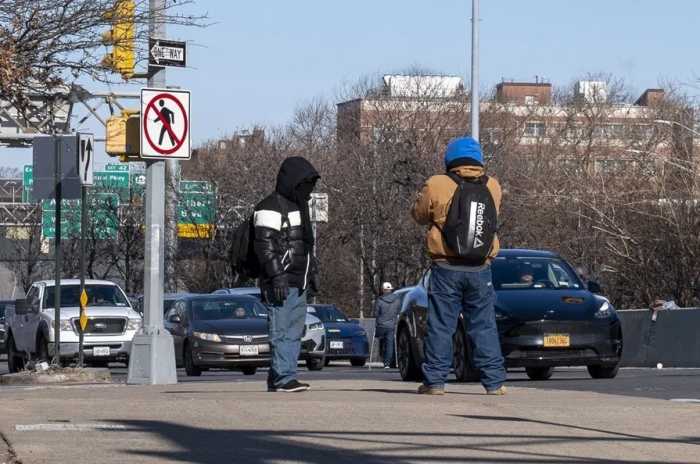Long Island officials have come out in support of Gov. Kathy Hochuls’ last-minute decision to halt congestion pricing, which would have seen drivers hit with a toll when ever they entered Lower Manhattan.
The congestion pricing plan, viewed by many Nassau officials as a tax on the middle class, called for charging motorists $15 to enter Lower Manhattan, as part of an attempt to reduce traffic, encourage people to use public transit and fund the MTA’s capital priorities. The plan was supposed to go into effect on June 30 but has now been indefinitely postponed.
NYS Assemblywoman Gina Sillitti said, “Thank you, Gov. Hochul, for pumping the brakes on congestion pricing. We certainly need to get more cars off the road and encourage residents to take mass transit, but this wasn’t it. This proposal should have been about benefiting the environment by supporting mass transit, not making money off the backs of our residents.”
Hochul said her decision to postpone congestion pricing was due to concerns about today’s economic climate, which is very different than when the plan was approved. In a June 5 release, she said the plan was enacted in a “pre-pandemic period, where workers were in the office five days a week, crime was at record lows, and tourism was at record highs.”
Assembly Member Charles Lavine agrees with Hochul.
“With the region not fully recovered from the pandemic and Long Islanders needing affordable access to Manhattan whether by car or train, Gov. Hochul’s pausing of congestion pricing is the right move at the right time,” Lavine said. “I praise the governor for being flexible and for putting the needs of middle-class New Yorkers who are struggling ahead of any political considerations.”
Hochul also noted that she was responding to “facts on the ground” when deciding to postpone the plan.
“In this moment of financial stress, high inflation, and already the high cost of living for so many New Yorkers, my focus must be on putting more money back in people’s pockets,” said Hochul. “And that’s why I must stand up for them and say no to implementing the congestion pricing toll at this time.”
State Sen. Steve Rhoads has long denounced the congestion pricing plan, saying that the toll would have been an unfair financial burden on Long Islanders.
“The decision by the Governor to postpone congestion pricing indefinitely is a major win for Long Islanders, small business owners, and anyone going into the city,” Rhoads said. “The fight is not over. We will continue to be vigilant and work with the Governor and the MTA to fully cancel congestion pricing once and for all.”
While many Long Island officials welcomed the news, advocates for mass transit who seek its implementation are wondering how long this pause will last.
The Riders Alliance—an advocacy group that fights for reliable, affordable public transit—is concerned about the future of the MTA and the underuse of mass transit. Since the governor’s announcement, the Riders Alliance reports that New Yorkers marched at subway stations to demand the governor start congestion pricing as previously promised on June 30. Congestion pricing was expected to raise $15 billion, with the proceeds used to upgrade the transit system.
The Riders Alliance said, “In an instant, the governor threw the future of the MTA and New York City into chaos, but she can reverse herself again with the flip of a switch.”
Gov. Hochul has not indicated when the plan will be redeveloped and reimplemented, but she assures her constituents that she will continue working to find a solution.
“In the coming months, I’ll continue working with the city, state and federal leaders to ensure we can achieve the objectives of congestion pricing without putting undue stress on already stressed New Yorkers. There never is only one path forward,” said Gov. Hochul. “Together, I’m confident we’ll be able to deliver the world-class public transit that riders deserve, ensure a cleaner planet for future generations, and continue to fuel the vitality and the comeback of New York City.”
In addition to reducing city traffic and increasing the use of mass transit, the congestion pricing plan was expected to generate a billion dollars a year in revenue for the MTA, which would fund anticipated transit improvements in the MTA’s capital plan.
Capital plan improvements included critical projects that keep the system in working condition, such as structural repairs, power system improvements and upgrades to bus depots. In addition, the MTA had more extensive plans, such as the Second Avenue Subway extension.
Now that the plan is on pause, the MTA expects “serious implications for the MTA’s 2020-2024 Capital Program and likely other aspects of the agency’s financial condition,” according to a joint statement from MTA Chief Financial Officer Kevin Willens and MTA General Counsel Paige Graves.
“Until there is a commitment for funding the balance of the 2020-2024 Capital Program, the MTA will need to reorganize the Program to prioritize the most basic and urgent needs,” said Willens and Graves’ statement. “Modernization and improvement projects like electric buses, accessible (ADA) stations and new signals will likely need to be deprioritized to protect and preserve the basic operation and functionality of this 100+-year-old system.”

































